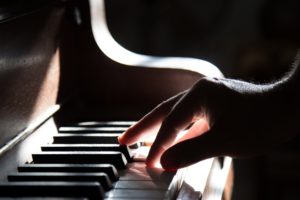written by Sara R. Longwell, M.M. Ed, LPMT, MT-BC
 As the Director of Music Therapy for Metro Music Makers, I love that we are able to offer adaptive lessons as part of our in-home services. Adaptive lessons are lessons taught by a board-certified, state-licensed music therapist, and they are a great fit for students with special needs, learning disorders and other diagnoses that make traditional lessons challenging. When I speak with parents of these children, they already know that their child is excited by and interested in music, but they’re frequently unsure about what instrument to choose for their child.
As the Director of Music Therapy for Metro Music Makers, I love that we are able to offer adaptive lessons as part of our in-home services. Adaptive lessons are lessons taught by a board-certified, state-licensed music therapist, and they are a great fit for students with special needs, learning disorders and other diagnoses that make traditional lessons challenging. When I speak with parents of these children, they already know that their child is excited by and interested in music, but they’re frequently unsure about what instrument to choose for their child.
I always recommend starting with piano, and if you’re a parent of a current or potential future adaptive student, I’d like to share with you some of the reasons for this.
Piano students make a lot of progress very quickly in the beginning. Because adaptive students face more challenges in the music learning process, it’s important for them to feel successful and build their self-esteem early on. Piano students tend to take off like a rocket when they start lessons, and even if they don’t put much time into practice at first, they’re going to see fast progress. Other instruments like guitar or violin, for example, have a steeper learning curve at the beginning, which can open the door for frustration or burnout. This exciting start for piano students can help fuel their enthusiasm and motivation later when their rate of progress slows down a little and requires a little more work.
Students with fine motor challenges are still very capable of learning piano skills, and through piano skills, they can improve their fine motor skills. A skilled music therapist can help a child with delayed or limited fine motor skills have the same quick and successful start on piano that any other child might have, with very limited frustration. They can learn to use their hands one at a time in the beginning and slowly put them together. At the same time, as the student learns to move their fingers independently and do separate things with each of their hands, they’ll improve their fine motor skills. Other instruments may require the student to use both of their hands right away, each hand having to do something different at the same time. This, again, can lead to frustration for students who struggle with fine motor issues.
Piano is the perfect stepping stone to ANY instrument the child may wish to pursue in the future. Through learning to play the piano, a student will learn to read treble and bass clef, improve their focus and attention, improve their fine motor skills, and learn to count rhythms correctly and more. These skills will transfer to almost any other instrument the student wishes to pursue, but they’ll begin that new instrument with a strong foundation that will make them more successful than they would otherwise be.
At Metro Music Makers, we currently also offer adaptive guitar and voice lessons, and we certainly welcome students who are interested in these instruments and can help them be successful at whatever instrument they choose. If you’re interested in adaptive lessons for your child on any of these instruments, please call us at 678.637.7293 for more information!
